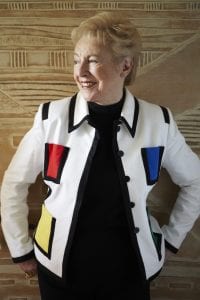Pioneering businesswoman and philanthropist Dame Stephanie ‘Steve’ Shirley will deliver a free public talk at the University of Lincoln, offering a fascinating insight into her life and career.
Dame Stephanie Shirley, one of Britain’s most celebrated entrepreneurs and philanthropists, will describe her remarkable journey from arriving in the UK as an unaccompanied child refugee in 1939 to building a ground-breaking all-woman software company, which was ultimately valued at $3 billion and made millionaires of 70 of her team members.
Her talk, entitled A Woman’s Story, will take place on Tuesday 21st March in the Stephen Langton Building on the University of Lincoln’s Brayford Pool Campus. You can book to attend the event on the University website.
An early pioneer of computing, Dame Stephanie founded a software company in 1962 from her dining room table with just £6 and soon after adopted the name ‘Steve’ to aid her in the business world. She employed only women until the 1975 Sex Discrimination Act made it illegal to do so. She offered part-time and flexible employment to professional women with dependants, pioneered new work practices, and changed the position of professional women (especially in the hi-tech industry) along the way.
Dame Stephanie also ensured that a quarter of her FTSE 250 Company was put into the hands of her staff and when it was acquired she began distributing her wealth to charitable causes. She retired in 1993 to concentrate on philanthropic work and her Shirley Foundation is now one of the top 50 grant-giving foundations in the UK. It has made charitable grants of more than £67 million, with current activity targeted at national strategies for autism.
Dame Stephanie will visit the University of Lincoln, where she was awarded an Honorary Doctorate of Science in September 2014, to deliver her talk and officially launch the University’s new Eleanor Glanville Centre.
Named after renowned 17th century entomologist Lady Eleanor Glanville, the new centre is designed to link the University’s equality mandates and initiatives, such as the Race Charter Mark and Athena SWAN Award (presented to universities for their commitment to tackling gender inequality in higher education), with new interdisciplinary research and scholarly activities.
The initiative is led by Professor Belinda Colston from the University of Lincoln’s School of Chemistry.
The story is available to read in full online.
